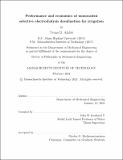Performance and economics of monovalent selective electrodialysis desalination for irrigation
Author(s)
Ahdab, Yvana D.(Yvana Damiella)
Download1252628419-MIT.pdf (25.14Mb)
Other Contributors
Massachusetts Institute of Technology. Department of Mechanical Engineering.
Advisor
John H. Lienhard V.
Terms of use
Metadata
Show full item recordAbstract
Reverse osmosis (RO) is the most widely used desalination technology for the treatment of irrigation source water and wastewater. Brackish groundwater, seawater, and agricultural effluent often contain both monovalent ions damaging to crops (Na⁺, Cl⁻) and divalent ions beneficial for crops (Ca²⁺, Mg²⁺, SO²⁻₄). RO removes both types of ions. These beneficial ions must then be reintroduced to the desalinated water through the addition of fertilizer. Monovalent selective electrodialysis (MSED) demonstrates greater potential to align with the needs of the agriculture sector. MSED is a variant of conventional electrodialysis (ED). MSED preferentially removes monovalent ions relative to multi-valent ions, defined as monovalent selectivity, via selective ion-exchange membranes. MSED operates at a significantly higher water recovery than RO. In the treatment of irrigation source water, MSED's selective removal may reduce fertilizer requirements and associated costs, while its greater recovery saves water and decreases the volume of brine for disposal. In the treatment of agricultural wastewater, MSED's selective removal of sodium, the biggest barrier to water reuse, may help greenhouses achieve minimal liquid discharge. Despite the possible economic and environmental benefits of MSED, the technology has not been commercially employed for the treatment of agricultural water. Rather, it has historically been used to concentrate sodium chloride from seawater brine for salt production. Consequently, the literature has focused on characterizing and designing MSED systems almost exclusively for high salinity applications. Because water composition greatly influences membrane behavior, separate analyses must be conducted to determine how MSED will perform for lower salinity applications relevant to agriculture. This thesis investigates the membrane performance, energetics, and economics of MSED for the treatment of irrigation source water and wastewater. Experiments are conducted on two types of MSED membranes, one of which has never been tested in the literature, to characterize the following system parameters as a function of feedwater composition: monovalent selectivity, ion transport, membrane resistance, membrane permeability, and limiting current density. Feedwaters used in the present MSED experiments simulate seawater and numerous compositions of brackish groundwater and agricultural effluent, which often vary with location. We find that both MSED membranes demonstrate notable monovalent selectivity for all tested feedwaters, although the selectivity varies with ionic composition and salinity. The experimentally-determined system parameters then serve as inputs to our MSED cost model. This model evaluates fertilizer and water savings as a function of farm size for the different feedwaters and membranes. These savings are weighed against the greater capital and operating costs of MSED relative to RO, in order determine the feasibility of MSED adoption for irrigation. While the energy consumption of MSED is comparable to that of RO for the treatment of brackish water and wastewater, MSED requires significantly more energy to desalinate seawater. Solar powered, in addition to conventionally powered, desalination is integrated into the cost model for seawater. The insights described in this thesis suggest that MSED may be the future of desalination for agriculture, particularly for brackish water and wastewater treatment.
Description
Thesis: Ph. D., Massachusetts Institute of Technology, Department of Mechanical Engineering, February, 2021 Cataloged from the official PDF of thesis. Includes bibliographical references (pages 261-276).
Date issued
2021Department
Massachusetts Institute of Technology. Department of Mechanical EngineeringPublisher
Massachusetts Institute of Technology
Keywords
Mechanical Engineering.